Subaru Forester: Remote engine start system (dealer option)

- Do not remote start a vehicle in an enclosed environment (e.g., in a closed garage). Prolonged operation of a motor vehicle in an enclosed environment can cause a harmful build-up of Carbon Monoxide. Carbon Monoxide is harmful to your health. Exposure to high levels of Carbon Monoxide can cause headaches, dizziness or in extreme cases unconsciousness and/or death.
- Before performing any servicing of the vehicle, temporarily place the remote engine start system in service mode to prevent the system from unexpectedly starting the engine.
Starting your vehicle
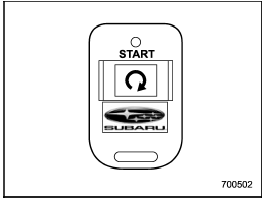
Starting your vehicle
The remote control start system is activated
by pressing the “ ” button twice
within 3 seconds on your remote control
transmitter. The system will check certain
pre-conditions before starting, and if all
safety parameters are correct, the engine
will start within 5 seconds. While the
vehicle is operating via remote engine
start, the vehicle’s power window features
will be disabled. Also, the system has a
timer and will shut down after 15 minutes if
you do not operate the vehicle. Press and
hold the “
” button twice
within 3 seconds on your remote control
transmitter. The system will check certain
pre-conditions before starting, and if all
safety parameters are correct, the engine
will start within 5 seconds. While the
vehicle is operating via remote engine
start, the vehicle’s power window features
will be disabled. Also, the system has a
timer and will shut down after 15 minutes if
you do not operate the vehicle. Press and
hold the “ ” button for 2 seconds
again to
turn the vehicle off. If the vehicle’s starter
cranks but does not start or starts and
stalls, the remote engine start system will
power off then attempt to start the vehicle
an additional four times. If the vehicle fails
to start after the additional attempts, the
remote engine start system will abort and
return to a non-activated state.
” button for 2 seconds
again to
turn the vehicle off. If the vehicle’s starter
cranks but does not start or starts and
stalls, the remote engine start system will
power off then attempt to start the vehicle
an additional four times. If the vehicle fails
to start after the additional attempts, the
remote engine start system will abort and
return to a non-activated state.
Remote start safety features
For safety and security reasons, the system will fail to start and beep the horn twice or shut down the engine during remote start operation if any of the following conditions occur.
- The brake pedal is pressed before the vehicle ignition switch is turned “on”.
- The key was already in the ignition switch.
- The engine hood is opened.
- The vehicle’s engine idle speed has reached a level over 3,000 rpm.
- The alarm is triggered by opening a door or the rear gate.
NOTE
- The security indicator light on the
dashboard will stop flashing while
under remote engine start operation,
but the vehicle is still protected.
- If the vehicle is entered during remote engine start operation, the system will not record entry in the alarm history.
Entering the vehicle while it is running via remote start
1. Unlock the vehicle doors using the
keyless entry system. If the vehicle’s
doors are unlocked manually using the
key, the vehicle’s alarm system will trigger
and the remote engine start system will
turn off. Inserting the key into the ignition
switch and turning it to the “ON” position or
pressing the unlock button “ ” on the
remote keyless entry transmitter will disarm
the alarm system. Refer to “Alarm
system”.
” on the
remote keyless entry transmitter will disarm
the alarm system. Refer to “Alarm
system”.
2. Enter the vehicle. Do not depress the brake pedal.
3. Insert the key into the ignition switch and turn to the “ON” position. If the ignition switch is accidentally turned to the “START” position, the system’s “starter anti-grind” feature will prevent the starter from re-cranking.
4. Depress the brake pedal. The remote starter disengages, the vehicle’s power window features are re-enabled and the vehicle will operate normally.
Entering the vehicle following remote engine start shutdown
An alarm trigger may occur if the vehicle is opened by the remote keyless entry transmitter within a few seconds immediately following remote engine start shutdown.
Pre-heating or pre-cooling the interior of the vehicle
Before exiting the vehicle, set the temperature controls to the desired setting and operation. After the system starts the vehicle, the heater or air-conditioning will activate and heat or cool the interior to your setting.
Service mode
In service mode, the remote start function is temporarily disabled to prevent the system from unexpectedly starting the engine while being serviced.
To engage the service mode
Turn the ignition switch to the “ON”
position, depress and hold the brake
pedal, then press and release the “ ”
button on the remote control transmitter
three times. The system will pause for 1
second and then flash the turn signal
lights and honk the horn three times
indicating that the system is in service
mode. When attempting to activate the
remote start system while in service
mode, the turn signal lights will flash and
the horn will honk two times and will not
start.
”
button on the remote control transmitter
three times. The system will pause for 1
second and then flash the turn signal
lights and honk the horn three times
indicating that the system is in service
mode. When attempting to activate the
remote start system while in service
mode, the turn signal lights will flash and
the horn will honk two times and will not
start.
To disengage the service mode
Turn the ignition switch to the “ON”
position, depress and hold the brake
pedal, then press and release the “ ”
button on the remote control transmitter
three times. The system will pause for 1
second and flash the turn signal lights 1
time indicating that the system has exited
service mode.
”
button on the remote control transmitter
three times. The system will pause for 1
second and flash the turn signal lights 1
time indicating that the system has exited
service mode.
NOTE
When taking your vehicle in for service,
it is recommended that you inform the
service personnel that your vehicle is
equipped with a remote control start
system.
Remote transmitter programming and programmable feature option
New transmitters can be programmed to the engine starter system in the event that remote transmitters are lost, stolen or damaged. The remote engine start system also has one programmable feature that can be adjusted for user preference.
The remote engine starter system can be programmed to either make an audible horn chirp upon remote start activation or not. Remote transmitter programming and feature programming can be adjusted using the following procedure.
1. Open the driver’s door (the driver’s door must remain opened throughout the entire process).
2. Insert the key into the vehicle’s ignition switch and turn to the “ON” position.
3. Locate the small black programming button behind the fuse box cover, on the driver’s side left under the dashboard panel.
4. Press and hold the black programming button for 10 to 15 seconds. The horn will honk and the turn signal lights will flash three times to indicate that the system has entered programming mode. At this point you can proceed to either step 5 or step 6.
5. To program a remote transmitter:
press and release the “ ” button on
each
transmitter. The horn will honk and the
turn signal lights will flash one time to
indicate a successful transmitter learn
each time the “
” button on
each
transmitter. The horn will honk and the
turn signal lights will flash one time to
indicate a successful transmitter learn
each time the “ ” button is pressed.
You
can program up to eight transmitters.
” button is pressed.
You
can program up to eight transmitters.
6. To toggle the Horn Confirmation chirps ON/OFF: press and release the brake to toggle the feature. The horn will chirp and the turn signal lights will flash one time to indicate Confirmation Horn Chirps are “OFF”. The horn will honk and the turn signal lights will flash 2 times to indicate Confirmation Horn Chirps are “ON”.
Pressing the brake pedal repeatedly will toggle the feature ON or OFF each time.
7. To exit the remote transmitter and feature programming mode, turn the ignition switch to the “LOCK” position, remove the key from the ignition switch and test operation of the remote transmitter(s) and horn confirmation feature.
System maintenance
Changing the remote control batteries

- Do not let dust, oil or water get on or in the remote engine start transmitter when replacing the battery.
- Be careful not to damage the printed circuit board in the remote engine start transmitter when replacing the battery.
- Be careful not to allow children to touch the battery and any removed parts; children could swallow them.
- There is a danger of explosion if an incorrect replacement battery is used. Replace only with the same or equivalent type of battery.
- Batteries should not be exposed to excessive heat such as sunshine, fire or the like.
The two 3-volt lithium batteries (model CR-1220) supplied in your remote control should last approximately 3 years, depending on usage. When the batteries begin to weaken, you will notice a decrease in range (distance from the vehicle that your remote control operates).
Follow the instructions below to change the remote control batteries.
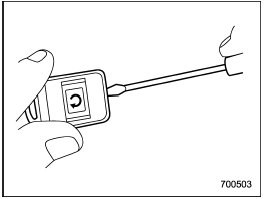
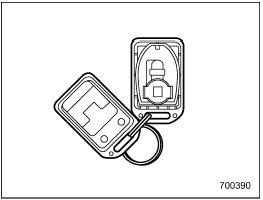
1. Carefully pry the remote control halves apart using a small flat-head screwdriver.
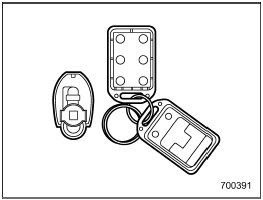
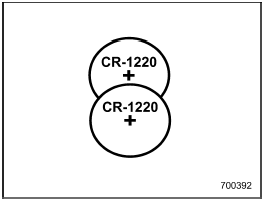
2. Remove the circuit board from the bottom half of the case and slide the white plastic battery holder out from under the battery tab releasing the batteries. Remove the old batteries and replace with new ones. Be sure to observe the (+) sign on the old batteries before removing them to ensure that the new batteries are inserted properly (battery “+” should be pointed away from the transmitter circuit board on both batteries).
3. Carefully snap the case halves back together, then test the remote control.

FCC WARNING
Changes or modifications not expressly
approved by the party responsible
for compliance could void
the user’s authority to operate the
equipment.
NOTE
This device complies with Part 15 of
the FCC Rules and RSS-Gen of IC
Rules. Operation is subject to the
following two conditions: (1) this device
may not cause harmful interference,
and (2) this device must accept
any interference received, including
interference that may cause undesired
operation.
See also:
If your vehicle overheats
- Do not continue to drive if your
vehicle overheats. Doing so could
cause engine damage or a vehicle
fire.
- To avoid the danger of being
scalded, never remove the radiator
cap while the engine is still hot.
When the radiator cap is ...
Uconnect™ Phone
Uconnect™ Phone is a voice-activated, hands-free, invehicle
communications system. Uconnect™ Phone allows
you to dial a phone number with your cellular
phone using simple voice commands (e.g., Call”
“Mike” ”Work or Dial” “248 ...

 Starting the engine
Starting the engine